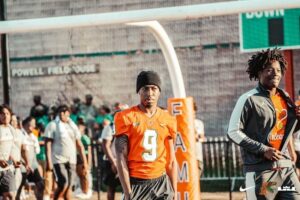
Student-athletes are always applauded for their hard work on and off the field, court, and track, but their mental health is often overlooked. These athletes are expected to attend practices, work hard in classes, and maintain any other outside responsibilities that come with life.
For some student-athletes, the transition from high school to collegiate level sports is a lot to manage. Others who don’t make it to the collegiate level, are left wondering what’s next.
Keon Cross, a former Morehouse College football athlete, had a tough transition from high school to collegiate level sports.
After failing to be recruited by any schools, Cross was very discouraged and wasn’t in the best mental space. An old coach got word of Cross having no offers and helped introduce him to the Morehouse Football program.
Because Cross committed late, there was no scholarship money left and he was classified as a walk-on player.
“The transition from high school to college ball was hard,” Cross said. “I had a healthy relationship with the game for years, but I started to feel like I was only playing because if I didn’t, I wouldn’t be successful.”
Cross retired from playing football for Morehouse and started his transition of becoming a regular student.
Patrick Bonner, a Florida A&M University football player, like Cross suffered from athletic depression succeeding as a first year as a collegiate athlete.
Depression can come from several things that student-athletes go through such as injury, competitive failure, retirement from a sport, loss of interest, and other factors according to the American Medical Society for Sports Medicine.
“My injury affected me in a way I never experienced,” said Patrick Bonner, a third-year football player at Florida A&M University. “It put me in a depressive state having to take an additional year off from covid after my injury and not being able to go out there with my guys and grind.”
During his first year, Bonner sustained a very uncommon injury that prevented him from playing. Bonner had extreme tendonitis and a small tear in his quadriceps tendon.
Bonner was recruited from his high school in Miami, FL in 2019 and offered a 75% scholarship to play safety as a rattler.
Bonner’s father is in the FAMU Football Hall of fame for his accomplishments as a quarterback in 1998. It was hard that Bonner could not accomplish the goals he had set for himself.
According to the NCAA, athletic departments across the country have noticed a rise in athletes with mental health disorders.
Shanel Brown, a Master’s psychology student and psychology research associate at the University of Central Florida, says therapy and strong support systems are essential when coping with depression and tough transitions.
“Throughout adulthood, it is okay to have people to lean on,” Brown said. “Talking to close friends, mentors, and therapists is important to moving forward and living in the present so your future can be brighter.”
Athletes are faced with many obstacles and it is imperative that they also manage life changes and maintain their mental health.